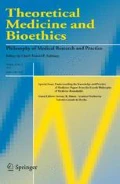Abstract
Increasingly, physicians are being asked to provide technical services that many (in some cases, most) believe are morally wrong or inconsistent with their beliefs about the meaning and purposes of medicine. This controversy has sparked persistent debate over whether practitioners should be permitted to decline participation in a variety of legal practices, most notably physician-assisted suicide and abortion. These debates have become heavily politicized, and some of the key words and phrases are being used without a clear understanding of their meaning. In this essay, I endeavor, firstly, to clarify the meaning of some of these terms: conscience, conscientious action, professional judgment, conscientious objection, conscience clauses, civil disobedience, and tolerance. I argue that use of the term conscientious objection to describe these refusals by health care professionals is mistaken and confusing. Secondly, relying on a proper understanding of the moral and technical character of medical judgment, the optimal deference that the state and markets ought to have toward professions, and general principles of Lockean tolerance for a diversity of practices and persons in a flourishing, pluralistic, democratic society, I offer a defense of tolerance with respect to the deeply held convictions of physicians and other health care professionals who hold minority views on contested but legal medical practices.
Similar content being viewed by others
Notes
The notion of conscience is more fully explored in [6].
This discussion of professional judgment draws heavily on [8].
Savulescu and Schuklenk have written: “If a service a doctor is requested to perform is a medical practice, is legal, consistent with distributive justice, requested by the patient or their appointed surrogate, and is plausibly in their interests, the doctor must ensure the patient has access to it. It is then irrelevant how defensible the doctor’s own moral take on the patient’s actions is” [18].
This has actually been done. Although most surgeons, responsibly, refused, the so-called “parrot man” was able to find a surgeon who would cut off his earlobes to make him look like a bird, which the patient thought was in his best interest [22].
That is, of course, unless very recent studies showing that LSD might be effective in treating post-traumatic stress disorder and other psychiatric conditions prove that it is safe and effective for such indications [25].
References
Death Penalty Information Center. 2018. States with and without the death penalty. Death Penalty Information Center, October 11. https://deathpenaltyinfo.org/states-and-without-death-penalty. Accessed October 30, 2018.
American Medical Association. 2016. Code of medical ethics opinion 9.7.3: Capital punishment. https://www.ama-assn.org/delivering-care/capital-punishment. Accessed October 30, 2018.
Snyder, Lois. 2012. American college of physicians ethics manual: sixth edition. Annals of Internal Medicine 156: 73–104.
District of Columbia Death with Dignity Act of 2016, D.C. Law 21–182 (2017).
Nirappil, Fenit. 2018. A year after D.C. passed its controversial assisted suicide law, not a single patient has used it. Washington Post, April 10. https://www.washingtonpost.com/local/dc-politics/a-year-after-dc-passed-its-assisted-suicide-law-only-two-doctors-have-signed-up/2018/04/10/823cf7e2-39ca-11e8-9c0a-85d477d9a226_story.html.
Sulmasy, Daniel P. 2008. What is conscience and why is respect for it so important? Theoretical Medicine and Bioethics 29: 135–149.
Sorabji, Richard. 2014. Moral conscience through the ages: Fifth century BCE to the present. Chicago: University of Chicago Press.
Sulmasy, Daniel P. 2017. Tolerance, professional judgment, and the physician’s discretionary space. Cambridge Quarterly of Healthcare Ethics 26: 18–31.
Pellegrino, Edmund D. 2001. The internal morality of clinical medicine: A paradigm for the ethics of the helping and healing professions. Journal of Medicine and Philosophy 26: 559–579.
Johnson, Sara K., Christopher A. Bautista, Seo Yeon Hong, Lisa Weissfeld, and Douglas B. White. 2011. An empirical study of surrogates’ preferred level of control over value-laden life support decisions in intensive care units. American Journal of Respiratory and Critical Care Medicine 183: 915–921.
Flexner, Abraham. 1915. Is social work a profession? School and Society 1: 901–911.
Pellegrino, E.D. 1977. The expansion and contraction of “discretionary space.” In Priorities for the use of resources in medicine, 99–112. Washington, DC: United States Government Printing Office.
Roe v. Wade, 410 U.S. 113 (1973).
Church Amendments, 42 U.S.C. § 300a-7.
Oregon Death with Dignity Act. ORS 127.800–995.
Locke, John. 2010. An essay concerning toleration. In A letter concerning toleration and other writings, ed. Mark Goldie, 105–140. Indianapolis: Liberty Fund.
Stahl, Ronit Y., and Ezekiel J. Emanuel. 2017. Physicians, not conscripts—conscientious objection in health care. New England Journal of Medicine 376: 1380–1385.
Savulescu, Julian, and Udo Schuklenk. 2017. Doctors have no right to refuse medical assistance in dying, abortion or contraception. Bioethics 31: 162–170.
Davis, Michael. 2011. Professional codes. In The Sage handbook of healthcare ethics, ed. Ruth Chadwick, Henk ten Have, and Eric M. Meslin, 63–72. London: Sage.
Sulmasy, Daniel P. 2016. Physician, heal thyself: Doctors in a pluralist democracy. In The professions and civic life, ed. Gary J. Schmitt, 95–111. Lanham: Lexington.
de Toqueville, Alexis. 2000. Democracy in America. Trans. Harvey C. Mansfield. Chicago: University of Chicago Press.
Raven, David. 2016. Man who chopped off own ears to look like his parrot has bizarre new name. Mirror, March 25. https://www.mirror.co.uk/news/uk-news/man-who-chopped-ears-look-7627260.
Vacco v. Quill, 521 U.S. 793 (1997).
Washington v. Glucksberg, 521 U.S. 702 (1997).
Belouin, Sean J., and Jack E. Henningfield. 2018. Psychedelics: where we are now, why we got here, what we must do. Neuropharmacology 142: 7–19.
Author information
Authors and Affiliations
Corresponding author
Additional information
Publisher's Note
Springer Nature remains neutral with regard to jurisdictional claims in published maps and institutional affiliations.
Rights and permissions
About this article
Cite this article
Sulmasy, D.P. Conscience, tolerance, and pluralism in health care. Theor Med Bioeth 40, 507–521 (2019). https://doi.org/10.1007/s11017-019-09509-5
Published:
Issue Date:
DOI: https://doi.org/10.1007/s11017-019-09509-5



